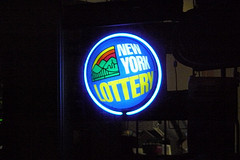Man Sentenced To 8.3 To 25 Years For Scamming Customer Out Of $5 Million Lottery Ticket Image courtesy of (Reuben Whitehouse)
“Taking advantage of poor people” might be a better term for what happened. “You exhibited some of the most rapacious greed I’ve seen in a long, long time,” the county judge told the convicted man at his sentencing.
According to the victim, he brought the ticket to the store where he bought it, and the owner’s sons told him that he had really won $5,000 and not $5 million. They gave him $4,000, he claims – there was a $1,000 ticket cashing fee. Lottery agents are not allowed to charge any such fee.
The victim gave up his lottery habit after that.
The store owner’s son maintains his innocence. He and his brother claim that they bought the ticket from their parents’ store and won, but avoided cashing it in because they were both financially comfortable and gambling is against their Muslim faith. (How holding on to the ticket for six years helps with that, they’ve never explained.)
Since the jackpot that wasn’t, the man who claims to be the real winner has held down multiple jobs, but had to declare bankruptcy two years after the win.
If you do win more than a few hundred dollars in the lottery, you should immediately sign the back of the ticket and keep it in a safe place until you are able to visit your nearest lottery office or mail it in.
Andy Ashkar gets maximum prison sentence over stolen $5 million lottery ticket [Syracuse Post-Standard] (Thanks, Arlene!)
PREVIOUSLY:
Want more consumer news? Visit our parent organization, Consumer Reports, for the latest on scams, recalls, and other consumer issues.


